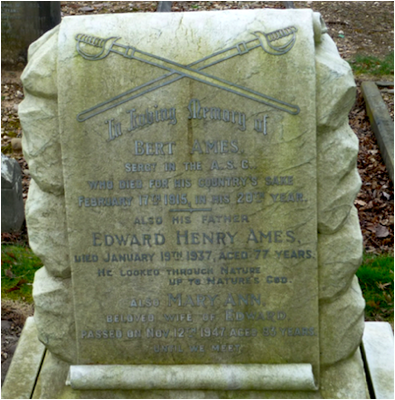Bertie ‘Bert’ Ames was born and raised in Birmingham where he joined the army. He arrived in Chelmsford early in the war when he was billeted in the town and was one of at least a dozen soldiers who died there in an outbreak of meningitis outbreak that hit the town in the early months of 1915. He was buried in Birmingham.
AMES, BERTIE*
Serjeant, Heavy Transport, Army Service Corps
He had only been taken ill the day before and was the seventh person to be killed by the outbreak in Chelmsford. Such was the local anxiety about the event that that the Chelmsford Borough Council's Town Clerk, George Melvin issued an official statement on the matter on 18th February 1915:
"Some cases of cerebrospinal fever having recently occurred in the Borough of Chelmsford, and exaggerated statements as to the extent of the outbreak having gained currency, it is officially stated on the authority of the Sanitary Committee and the Medical Officer of Health that the exact number of cases of this disease existing at present in the Borough at the present time is 11. Since the original outbreak some few weeks ago the total number of cases in Chelmsford including those mentioned above, has been 17 - 13 military and 4 civil - and the total number of deaths which have occurred is six (a seventh was to occur later in the week of the statement).
The matter is receiving the careful attention of the Local Government Board, the Town Council, and the Military Authorities, and every possible precaution is being taken to prevent the spread of the disease.
The Local Government Board state that the fever is not of a rare occurrence in the United Kingdom, and in the last forty years the malady has been known to be present in a considerable number of different localities in England and Wales, several of the outbreaks having taken place in recent years. The Board also state - Whether cerebrospinal fever is spread by direct infection from person to person is a matter of uncertainty; indeed, there is as yet no definite knowledge as to the war or ways in which the transmission may take place. Since, however,, the possibility of direct personal infection cannot, on the evidence available, be excluded, it will be wise to endeavour to secure, as far as practicable, the isolation of the sick from the healthy. It will also be advisable to apply suitable measures if disinfection to premises that have been occupied by the sick and to articles that may been in relation with them."
Bert's body was taken to his home city of Birmingham and today lies in grave B. 20934 at Birmingham (Yardley) Cemetery. His parents lived at 790 Washwood Heath Road in Birmingham.
The military victims of the 1915 outbreak of cerebro-spinal meningitis in Chelmsford included:
Harold Leach - 24th January 1915
Charles William Giles - 25th January 1915
Ernest Stone - 8th February 1915
Frederick Sims - 11th February 1915
Bertie Ames - 17th February 1915
William Ernest Bruton - 17th February 1915
Henry Gilbert Edmondson - 19th February 1915
William Andrew - 20th February 1915
Frederick James Andrewartha - 26th February 1916
Thomas Charles Tooth - 4th March 1915
Walter Ernest Harris - 22nd March 1915
Samuel Herbert Bolton - 25th March 1915
140323

Bert was born in Birmingham, Warwickshire in 1895, the son of Edward Henry Ames (1859-1937) and Mary Ann Ames (nee Trolley) (1864-1947).
In 1901 the census recorded five year-old Bert with his parents, three siblings at two siblings in Aston, Birmingham. His father was then an agent for Prudential Assurance.
A decade later the next census found Bert, aged 15, with his parents and three siblings at 161 Warren Road in Washwood Heath, Birmingham. Bert was employed by an edge tools manufacturer as a clerk. Meanwhile his father was an insurance broker.
During the First World War Bert joined the army in Birmingham and served as Serjeant T/294 in the Transport Section of the Army Service Corps. He
was billeted in Chelmsford in the initial months of the war, staying in a property in New Writtle Street.
Aged 22 and unmarried, Bert died from cerebro-spinal meningitis (also known as 'spotted fever') on 17th February 1915 at 'Kenilworth' in Moulsham Street, a special hospital set up by the military and local health authorities in response to an outbreak of the disease that affected Chelmsford in the early part of 1915.